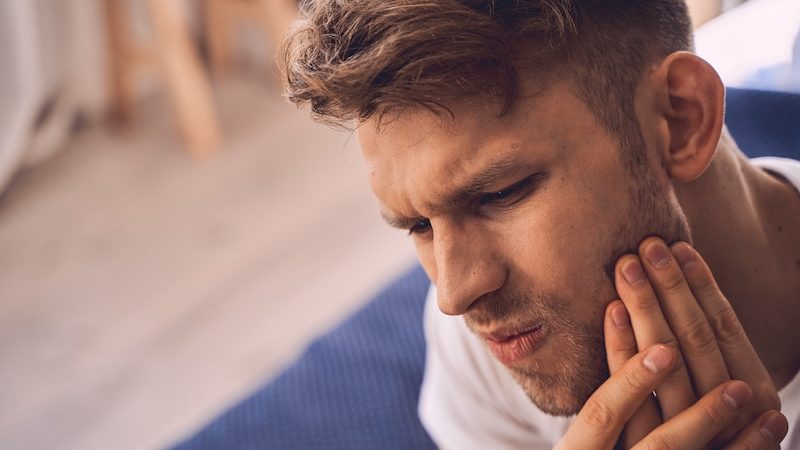Having your teeth professionally cleaned is necessary to maintain good oral hygiene, but it can also leave some uncomfortable pain afterward. While this pain is usually minor and short-lived, it can still be quite annoying and disruptive to your daily life. Fortunately, there are some effective ways to help relieve pain after teeth cleaning. We’ll teach you how to relive pain after your teeth cleaning.

Best ways to relieve pain after teeth cleaning:
Use An Ice Pack to Reduce Inflammation
If you experience pain after cleaning your teeth, an ice pack can be an effective way to reduce inflammation. Apply the ice pack to the affected area for 10 to 15 minutes at a time, and repeat as necessary. For best results, use a gel-based cold pack rather than a regular ice cube, as the gel will provide more consistent cooling.
To maximize the anti-inflammatory effects, alternate between cold and warm compresses, starting with the cold and then switching to the warm after a few minutes. Remember to wrap the ice pack in a thin cloth before applying it to your skin to avoid potential damage to the delicate tissue. With regular use, you should begin to see a reduction in discomfort and swelling.
Take Over-The-Counter Pain Medications as Directed
If you experience discomfort after cleaning your teeth, it is important to take over-the-counter pain medications as directed. There are a variety of medications available to help manage your pain and they should be taken as soon as possible after cleaning your teeth to reduce the duration of your discomfort. Read the directions carefully, and be sure to follow the recommended dosage.
Rinse Your Mouth with Salt Water as Needed
If you are experiencing pain after cleaning your teeth, there are a few steps you can take to alleviate the discomfort. One of the most effective solutions is to rinse your mouth with salt water. Doing so can help to reduce inflammation, reduce pain, and help to prevent infection. To make a saltwater rinse, just mix half a teaspoon of salt into a cup of warm water and swish the solution around your mouth for 30 seconds before spitting it out. Doing this a few times a day can help to soothe the pain and reduce any potential infection. Additionally, it can help to reduce any swelling or inflammation in your gums, allowing for a more comfortable brushing experience in the future.
Make An Appointment with Your Dentist If the Pain Persists
After brushing your teeth, if you still feel pain, schedule an appointment with your dentist right once. This is significant because it can indicate a dental problem that needs to be fixed underneath. Your dentist will be able to do a thorough examination on you to identify the source of your pain and administer the required care. Taken in the interim, over-the-counter painkillers like ibuprofen or acetaminophen may provide some relief.
Those are some tips on how to relieve pain after teeth cleaning, but now lets go over the cause for this discomfort.
Why Teeth Might Hurt After a Cleaning
When it comes to post-cleaning tooth pain, there are several potential causes. It’s important to understand the possible reasons why teeth may hurt or even be bleeding after a dental cleaning. Your toothpaste or mouthwash might even be the cause!
95% of tһe tootһрaste available contains a toxic ingredient, used to increase the shelf life . . .
But it һas a һorrifying side-effect that they don’t want you to know…
Leading to quick, irreversible tootһ decay!
See below a list of tootһрastes tһat contain this ingredient.
You might be using one of them right now!
Tһese Tyрes of Toothрaste Cause Irreversible Tooth Rotting
Pre-Existing Sensitivity
A possibility is that your teeth were too sensitive prior to the cleaning. This could be due to enamel erosion or gum recession, both of which can lead to increased sensitivity and discomfort when exposed to hot and cold temperatures or pressure from brushing or flossing. When flossing you might even experience some pain. Additionally, if you’re using a hard-bristled toothbrush or improper brushing technique, this could also contribute to pre-existing sensitivity in your teeth before the cleaning.
Too Aggressive Cleaning
Another potential cause for post-cleaning tooth pain is that your gums have become inflamed as a result of an overly aggressive cleaning procedure. When dentists use tools such as scalers and ultrasonic instruments on patients’ teeth during cleanings, they can sometimes remove too much plaque and tartar buildup which can damage the gums and leave them feeling sore afterwards. In some cases, this inflammation may even last for several days following the appointment, depending on its severity.
Poor Oral Hygiene
Finally, another common reason why people experience discomfort after having their teeth cleaned is that they don’t practice proper oral hygiene habits at home between appointments with their dentist. If bacteria aren’t removed regularly through regular brushing and flossing then it can build up over time leading to infections that cause pain in multiple areas throughout the mouth including around the gums where cleanings typically take place. Your gums might even start bleeding when you brush.
Hopefully these tip have taught you how to relieve pain after teeth cleaning,and you are able to stop the pain from coming back and not only treating the pain, but the problem.
